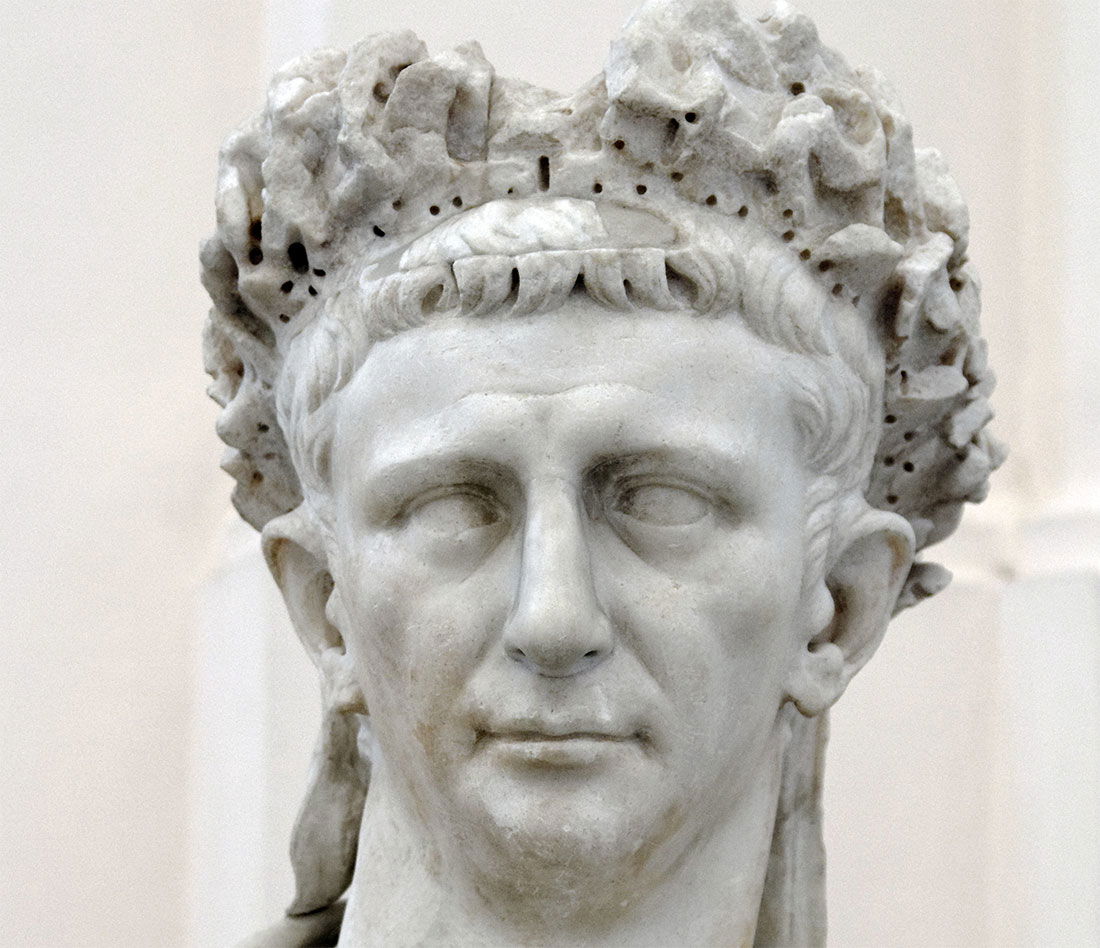Death of the Emperor Claudius
Claudius died on 13 October AD 54. Roman opinion was convinced that Agrippina had poisoned him.

Tiberius Claudius Caesar Augustus Germanicus, the ‘I Claudius’ of Robert Graves’s splendid historical novels, was one of the few historians who has ever exercised real power. As a young man, ignored and left to his own devices by his family, but encouraged by Livy, who spotted his talent, he wrote histories of Etruria and Carthage, began a history of Rome and wrote a historical treatise on the Roman alphabet. All his works are lost, unfortunately. His family kept him out of sight as far as they could because he was so uncouth and unattractive. Constantly ill and irritatingly clumsy, he had a bad stammer and a permanently runny nose, his head twitched and he dribbled. One theory is that he suffered from cerebral palsy.
Claudius was sufficiently a figure of fun to survive the murderous reign of his nephew Caligula. Found hiding behind curtains in the palace, shaking with fright, when Caligula was murdered in AD 41, he was made emperor by the Praetorian Guard. The Senate, which had meanwhile been discussing the restoration of the republic, was forced resentfully to acquiesce. It was Claudius who annexed Britain to the Empire and in 43 he crossed the Channel himself to see his legionaries take Camulodunum (Colchester). The inscription on his triumphal arch in Rome said that he ‘brought barbarian peoples beyond Ocean for the first time under Rome’s sway.’
In 48 Claudius’s young and promiscuous third wife, Valeria Messalina, attempted a coup against him with her latest lover, Gaius Silius. The coup failed, Messalina killed herself and Silius was executed. Claudius told the Praetorian Guard to knock him on the head if he ever married again, but within a few months he took as his fourth wife another unscrupulous and seductive beauty much younger than himself, his niece Agrippina, a sister of Caligula. She was 33 to Claudius’s 58 and she had a 12-year-old son by a former marriage, Lucius Domitius Ahenobarbus, better known as Nero. The Senate had to pass a special decree to authorise what would otherwise have been an illegal incestuous union. The ambitious and power-hungry Agrippina was determined that Nero should be Claudius’s successor, rather than the Emperor’s own son by Messalina, the nine-year-old Britannicus. Nero was accordingly adopted by Claudius as his son and promised the hand of the Emperor’s daughter Octavia, whose current betrothed was publicly accused of incest with his attractive sister, and committed suicide. Tacitus records Claudius once saying when the worse for drink that he seemed destined to bear the misbehaviour of his wives and then punish it.
On 12 October AD 54, the 64-year old emperor presided over a banquet on the Capitol, with his taster, the eunuch Halotus, in attendance. He ate his final meal in his palace the following day. The official story was that he was stricken while watching a performance by some actors. Roman opinion, however, was convinced that Agrippina had poisoned him, either because she would not wait any longer for Nero, now seventeen, to succeed while she could still control him or because she feared that Claudius was about to reinstate Britannicus as his heir. According to Tacitus, Agrippina got Halotus to feed Claudius a poisoned mushroom and when that did not work, Claudius’s doctor put a poisoned feather down his throat, ostensibly to make him vomit. Another account, reported by Suetonius, had a dish of poisoned mushrooms given by Agrippina herself and said the second attempt involved poisoned gruel or a poisoned enema. It was a lingering, painful death.
Agrippina apparently delayed announcing the death for a while, to wait for an astrologically favourable moment and until word had been sent to the Praetorian Guard. When the moment came, Nero was escorted to the Praetorian barracks where he was hailed as Imperator. The Senate quickly followed suit and when Nero delivered the expected eulogy of the dead Emperor, the senators sniggered. The Senate also decreed the deification of Claudius, which was needed to bolster Nero’s position as ‘Son of the Deified’. Lucius Annaeus Seneca, who had overseen Nero’s education, wrote a mocking account of ‘The Pumpkinification of the Divine Claudius’. It describes the late Emperor presenting himself at the gates of Olympus, where the gods contemptuously reject him and pack him off to Hades.
Britannicus died in 55. Nero allegedly had him poisoned and in 59 he sent a trusted officer to kill Agrippina. It was said that she asked the officer to finish her by thrusting his sword into her womb, the womb that had borne Nero.